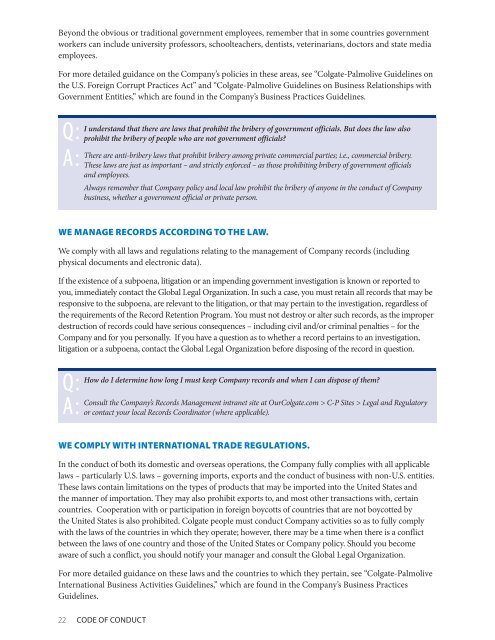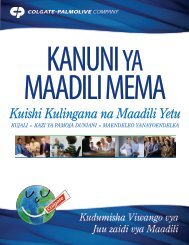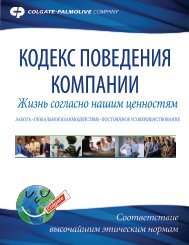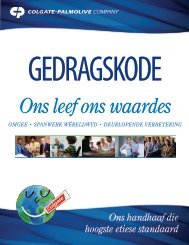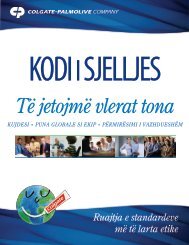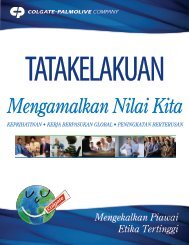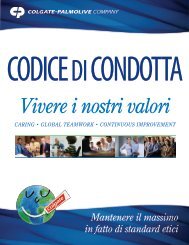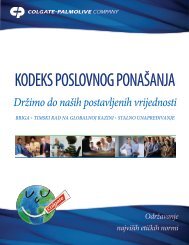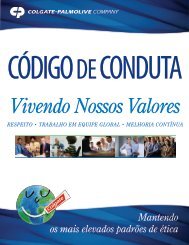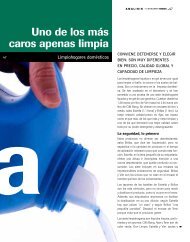WE DO NOT MAKE POLITICAL CONTRIBUTIONS.No funds or assets of the Company may be used for contributions to any political party or candidate,whether federal, state or local, in the United States or abroad. A political contribution includes bothdirect (i.e., money) and in-kind contributions. In-kind contributions include the purchase of fundraisingtickets, contribution of products, volunteer work by <strong>Colgate</strong> people within normal business hours and theuse of <strong>Colgate</strong> facilities for fundraising or political purposes. If you have a question regarding an in-kindcontribution, please contact the Global Legal Organization.The Company is prohibited from compensating or reimbursing any <strong>Colgate</strong> person or individualassociated with the Company (including outside lobbyists), directly or indirectly, in any form, for politicalcontributions that the person intends to make or has made.Individual <strong>Colgate</strong> people remain free to make personal contributions to candidates or parties of theirchoice. A personal contribution is the responsibility and burden of the individual person. <strong>Colgate</strong> willaccept no responsibility for or obligation with respect to a personal contribution. Further, a personalcontribution shall not be made with the intention of assisting <strong>Colgate</strong> or one of its operating companies inobtaining or retaining business.Like most multinational companies, <strong>Colgate</strong> belongs and pays annual dues to a number of trade andindustry associations in the United States. To help ensure that these trade associations do not use anyportion of the dues paid by <strong>Colgate</strong> for political contributions, <strong>Colgate</strong>'s Chief Ethics and ComplianceOfficer annually informs the U.S. trade associations of our policy prohibiting such contributions andrequires each trade association to participate in an annual certification process. To learn more, pleaserefer to our political contributions policy, which can be found in the Governance section of the www.<strong>Colgate</strong>Palmolive.com website.WE DEAL ETHICALLY WITH OTHERS.It is the Company’s policy that <strong>Colgate</strong> people must comply fully with all applicable anti-bribery lawsworldwide and must not engage in any acts of bribery. Therefore, you should not seek to influence thejudgment or conduct of any external party with whom you might be conducting Company business bypromises of gifts or other benefits, or by any other unlawful inducement.In addition, certain lobbying laws may require the Company and/or its people to register and report as alobbyist if a <strong>Colgate</strong> person communicates with a government employee for the purpose of influencinglegislation or certain other official actions. If you are engaging in any such activity, you must notify theGlobal Legal Organization.<strong>Colgate</strong>’s commitment to dealing legally and ethically with governments applies worldwide. Company policy,the U.S. Foreign Corrupt Practices Act and similar anti-bribery laws around the world prohibit our people ortheir agents from giving or offering to give money or anything of value — whether in cash or not, or whetherdirectly or indirectly through others — to any foreign official (i.e., foreign government employee, foreignpolitical party, or party official or candidate for foreign political office) to induce that official to affect anygovernmental act or decision, or to assist the Company in obtaining or retaining business.To ensure that you do not violate this standard, it is the Company’s policy that, except for legally mandatedfees (for example, required permit or license fees), no payments, entertainment, gifts or other items of valuewill be made to foreign officials, directly or indirectly, unless approved in advance by the Global LegalOrganization as lawful under U.S. and other applicable laws.Always be direct and honest in dealings and communications with government employees. Any knowingor willful false statements to government employees (oral or written), and particularly any false statementunder oath, can expose the Company and its people to substantial penalties.COLGATE-PALMOLIVE COMPANY 21
Beyond the obvious or traditional government employees, remember that in some countries governmentworkers can include university professors, schoolteachers, dentists, veterinarians, doctors and state mediaemployees.For more detailed guidance on the Company’s policies in these areas, see “<strong>Colgate</strong>-Palmolive Guidelines onthe U.S. Foreign Corrupt Practices Act” and “<strong>Colgate</strong>-Palmolive Guidelines on Business Relationships withGovernment Entities,” which are found in the Company’s Business Practices Guidelines.Q:A:I understand that there are laws that prohibit the bribery of government officials. But does the law alsoprohibit the bribery of people who are not government officials?There are anti-bribery laws that prohibit bribery among private commercial parties; i.e., commercial bribery.These laws are just as important – and strictly enforced – as those prohibiting bribery of government officialsand employees.Always remember that Company policy and local law prohibit the bribery of anyone in the conduct of Companybusiness, whether a government official or private person.WE MANAGE RECORDS ACCORDING TO THE LAW.We comply with all laws and regulations relating to the management of Company records (includingphysical documents and electronic data).If the existence of a subpoena, litigation or an impending government investigation is known or reported toyou, immediately contact the Global Legal Organization. In such a case, you must retain all records that may beresponsive to the subpoena, are relevant to the litigation, or that may pertain to the investigation, regardless ofthe requirements of the Record Retention Program. You must not destroy or alter such records, as the improperdestruction of records could have serious consequences – including civil and/or criminal penalties – for theCompany and for you personally. If you have a question as to whether a record pertains to an investigation,litigation or a subpoena, contact the Global Legal Organization before disposing of the record in question.Q:A:How do I determine how long I must keep Company records and when I can dispose of them?Consult the Company’s Records Management intranet site at Our<strong>Colgate</strong>.com > C-P Sites > Legal and Regulatoryor contact your local Records Coordinator (where applicable).WE COMPLY WITH INTERNATIONAL TRADE REGULATIONS.In the conduct of both its domestic and overseas operations, the Company fully complies with all applicablelaws – particularly U.S. laws – governing imports, exports and the conduct of business with non-U.S. entities.These laws contain limitations on the types of products that may be imported into the United States andthe manner of importation. They may also prohibit exports to, and most other transactions with, certaincountries. Cooperation with or participation in foreign boycotts of countries that are not boycotted bythe United States is also prohibited. <strong>Colgate</strong> people must conduct Company activities so as to fully complywith the laws of the countries in which they operate; however, there may be a time when there is a conflictbetween the laws of one country and those of the United States or Company policy. Should you becomeaware of such a conflict, you should notify your manager and consult the Global Legal Organization.For more detailed guidance on these laws and the countries to which they pertain, see “<strong>Colgate</strong>-PalmoliveInternational Business Activities Guidelines,” which are found in the Company’s Business PracticesGuidelines.22 CODE OF CONDUCT


